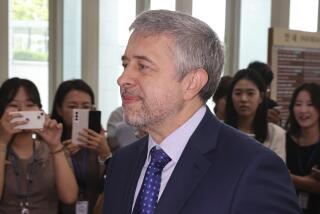Lack of Progress in N. Korea Talks Fodder for Accusations
- Share via
BEIJING — U.S. and North Korean officials traded accusations Saturday over why four days of talks aimed at ending the North’s nuclear weapons programs ended without appreciable progress.
The six-nation talks, which began Wednesday in Beijing, included South Korea, China, Japan and Russia. Although negotiators agreed to create a working group and to hold another meeting before July, they failed to move forward on any substantive issues, including reaching agreement on the scope and capability of Pyongyang’s weapons programs and the framework needed to dismantle them and verify progress.
Vice Foreign Minister Kim Kye Gwan, who led the North Korean delegation, blamed “U.S. hostile policies toward North Korea” for the inconclusive results.
North Korea negotiated in good faith, only to see Washington block progress, Kim told reporters at a rare news conference in his nation’s embassy in Beijing.
“My delegation adopted a serious, very businesslike manner,” Kim said beneath an oversized picture of North Korean leader Kim Jong Il and a banner that read, “Long life to the DPRK, my beautiful homeland.” The Democratic People’s Republic of Korea is the nation’s official name.
“However, the serious attitude by our delegation did not enjoy a corresponding attitude from the U.S. side this time,” he added. “The U.S. delegation has repeated their lies again and again.”
Senior U.S. officials agreed that the North Korean delegation showed professionalism, especially compared with first-round talks in August -- part of a far better atmosphere overall that is encouraging, they said. But in a meeting with reporters, they added that the gap on substantive issues remained huge.
One ongoing stumbling block, U.S. officials said, is North Korea’s denial that it has a highly enriched uranium weapons program in addition to its acknowledged plutonium program. New evidence continues to surface from Pakistan and elsewhere that Pyongyang has a uranium program, a U.S. official said, speaking on condition that he not be identified.
“You know it, we know it, and third countries know it,” the official said he told members of the North Korean delegation. But the U.S. delegation declined to provide North Korea with hard evidence about the program, saying that doing so would only make it easier for Pyongyang to hide it in the future.
Kim, at his news conference, insisted that the North has no such program.
North Korea has had “missile dealings” with Pakistan for hard currency, he said, but these have nothing to do with highly enriched uranium.
“We have no facilities, scientists or technology related to this HEU program,” Kim said, adding that North Korea uses natural uranium and only in peaceful energy programs.
A second continuing dispute, officials said, was over Pyongyang’s position that it should not have to dismantle what it called its peaceful, civilian atomic energy program as part of any deal on nuclear weapons.
“The problem is, I’m not aware of any peaceful nuclear programs in the DPRK,” the U.S. official said.
A third major point of contention is the steps and timing involved in winding down Pyongyang’s weapons programs.
The U.S. has insisted that only a “complete, verifiable and irreversible dismantlement” will justify normalizing relations and resuming aid.
North Korea wants such concessions to precede or coincide with any weapons freeze. “In order to reverse a train, you need to stop it first,” Kim said.
Ultimately, analysts said, unless one side is willing to budge, the stalemate will drag on. Several gave North Korea higher marks than the U.S. for flexibility this round.
“Neither the U.S. nor North Korea made any real compromises,” said Pang Zhongying, a professor of international relations at Nankai University in Tianjin, China. “Even agreeing on working groups still only leads to three, four, five more rounds of talks. I don’t see much prospect of a fundamental breakthrough in the foreseeable future.”
The lack of major progress raises the prospect that North Korea will have more time to build more nuclear weapons before any deal is reached.
“That’s true,” a senior U.S. official said. “It’s a serious matter that we haven’t solved it rapidly. But I don’t know how to solve it rapidly without getting into a bidding contest.... That’s not the right approach.”
As host, China attempted Saturday to put the best face forward on the talks, touting the nations’ ability to eventually resolve the low-boil crisis.
“What is important is that difficulties are gradually being narrowed,” Wang Yi, China’s vice foreign minister, said at a closing news conference.
Beijing had hoped that the talks would produce a joint statement, but a last-minute insistence by North Korea on wording changes ruled that out and delayed the closing ceremony by three hours.
In a strange peek behind the curtain, Chinese television carried live shots of five high-level delegations waiting anxiously as North Korea’s spot at the table remained empty. Finally, Kim and his entourage strode in and took their seats. In the end, the group had to settle for a nonbinding “chairman’s statement,” which subjects the process to more backsliding.
“They didn’t make a lot of sense,” a senior U.S. official said of the wording changes North Korea demanded, without being more specific. “This was about not having a statement.”
More to Read
Sign up for Essential California
The most important California stories and recommendations in your inbox every morning.
You may occasionally receive promotional content from the Los Angeles Times.










